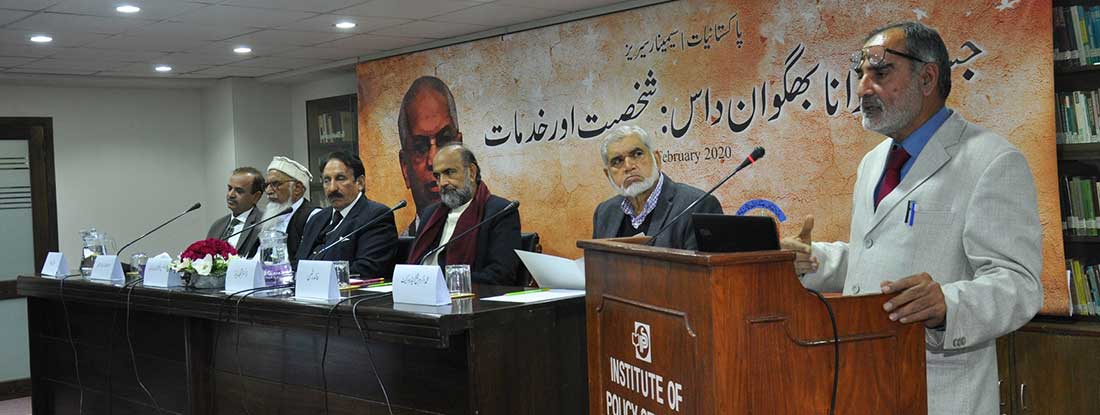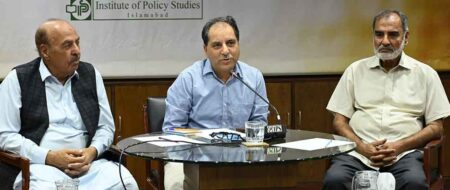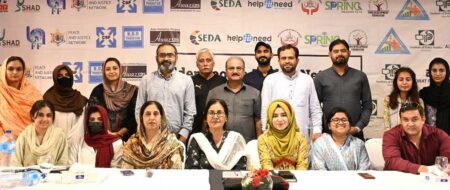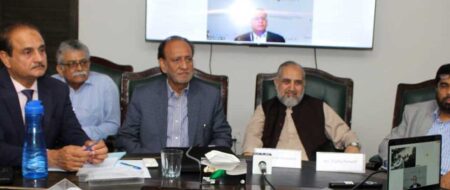‘Justice Rana Bhagwandas (1942-2015): Personality and Services’
Justice Rana Bhagwandas hailed for integrity, services for nation-building
Many
non-Muslim Pakistanis in recent history have played a crucial role in the
nation-building as well as developing and strengthening the state institutions
of the Islamic Republic of Pakistan. It is imperative for the ideological
development of the country’s youth to acquaint themselves with the instrumental
role that personalities like Justice Rana Bhagwandas played in laying the
foundations and setting the direction of legal, judicial, constitutional and
socio-political development of the country.
This
was the essence of a memorial seminar ‘Justice Rana Bhagwandas (1942-2015):
Personality and Services’, which was held as part of the Pakistaniyaat
sessions being co-organized by the Council of Islamic Ideology (CII) and
Institute of Policy Studies (IPS), Islamabad on February 11, 2020. The earlier
sessions as part of the seminar series have covered personalities such as
Justice AR Cornelius, Allama Muhammad (Leopold) Asad and Dr Mahmood Ahmad
Ghazi.
Held
at IPS premises, the seminar was addressed by Justice (retd) Iftikhar Muhammad
Chaudhry, former chief justice of Pakistan, Dr Qibla Ayaz, chairman CII, Khalid
Rahman, executive president IPS, Dr Ramesh Kumar Vankwani, MNA, Maulana Abu
Ammar Zahid-ur-Rashidi, religious scholar, senior lawyer Advocate Akram Sheikh,
Mahesh Kumar, president, Islamabad Hindu Panchayat, and Subhash Chandar, the
brother-in-law of Justice Rana Bhagwandas and Riyazul Haque, former senior
bureaucrat and member IPS-National Academic Council. A special message
from Senator Raja Zafar ul Haq was also read out by Syed Nadeem Farhat, senior
research officer at IPS.
Recalling
the services of Justice Rana Bhagwandas for the country, his contemporaries
said that the former acting chief justice of Pakistan was known for his
patriotism as well as for always acting in accordance with the law. Having a
master’s degree in Islamic Studies, he was expertly-versed in Islamic
jurisprudence. He was seen as a man of integrity and principle even among his
contemporaries, setting the bar very high with his character and conduct,
keeping himself balanced and impartial at all times, and always making his
decisions on merit, without any tilt, tint or bias.
The
speakers maintained that the contributions of non-Muslim national heroes such
as Justice Rana Bhagwandas, Justice A.R. Cornelius and Justice Durab Patel –
who hailed from minority communities, yet elevated themselves to the highest
ranks in judiciary on the back of their dedication and hard work, making
meaningful contributions to the national development – must be recalled and
recollected not only to serve as a source of guidance and inspiration but also
to reinforce interfaith harmony.
The
panelists also viewed that Pakistan, like any other country, faced its own set
of interfaith and sectarian challenges, but it was heartening to see that the
state policy has always remained very non-discriminatory in this regard. There
does exist the presence of some extremist, radicalized segments in the country,
the state’s system as well as the society however have repeatedly shown the
resilience, capacity and tendency to address and respond to the issues faced by
the minorities.












